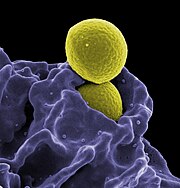Immunobiology

A bacterium (MRSA, yellow) being ingested by an immune cell (Neutrophil, purple).
|
|
| System | Immune |
|---|---|
| Subdivisions | Genetic (Immunogenetics) |
| Significant diseases | |
| Significant tests | |
| Specialist | Immunologist |
| Occupation | |
|---|---|
|
Occupation type
|
Profession / Specialty |
|
Activity sectors
|
|
| Description | |
|
Education required
|
|
|
Fields of
employment |
|
|
Related jobs
|
|
Immunology is a branch of biology that covers the study of immune systems in all organisms. It was the Russian biologist Ilya Ilyich Mechnikov who boosted studies on immunology, and received the Nobel Prize in 1908 for his work. He jabbed the thorn of a rose on a starfish and noted that, 24 hours later, cells were surrounding the tip. It was an active response of the body, trying to maintain its integrity. It was Mechnikov who first observed the phenomenon of phagocytosis, in which the body defends itself against a foreign body, and coined the term. Immunology charts, measures, and contextualizes the: physiological functioning of the immune system in states of both health and diseases; malfunctions of the immune system in immunological disorders (such as autoimmune diseases, hypersensitivities, immune deficiency, and transplant rejection); the physical, chemical and physiological characteristics of the components of the immune system in vitro, in situ, and in vivo. Immunology has applications in numerous disciplines of medicine, particularly in the fields of organ transplantation, oncology, virology, bacteriology, parasitology, psychiatry, and dermatology.
Prior to the designation of immunity from the etymological root immunis, which is Latin for "exempt"; early physicians characterized organs that would later be proven as essential components of the immune system. The important lymphoid organs of the immune system are the thymus and bone marrow, and chief lymphatic tissues such as spleen, tonsils, lymph vessels, lymph nodes, adenoids, and liver. When health conditions worsen to emergency status, portions of immune system organs including the thymus, spleen, bone marrow, lymph nodes and other lymphatic tissues can be surgically excised for examination while patients are still alive.
...
Wikipedia
